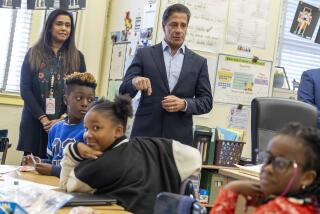Church’s Program Helps Solve Homework Problems : Education: After-school sessions allow students to finish class assignments and work on projects while giving parents some relief.
- Share via
Dorthea Morris of Ladera is a veteran of America’s nightly homework dramas, in which perfectly respectable adults become anxious, exhausted nags trying to nurture future Bill and Hillary Clintons.
After a full day’s work, she would fetch her daughter, Nicole, now a fourth-grader, fight her way home through rush-hour traffic and fix dinner. It was not the ideal prelude to an evening of long division and spelling.
“We just weren’t in the frame of mind to deal with each other,” said Morris. “I’d be saying, ‘Nicole, what did I tell you the answer was the last time you asked?’ ”
But all that ended last month when Morris spotted the large orange banner outside Inglewood’s First United Methodist Church advertising homework assistance. She dialed the phone number and enrolled Nicole in what may be the first homework program of its kind in the Southland.
Unlike a lot of other after-school and tutoring efforts, which are usually aimed at disadvantaged or latch-key children, parents pay for this program.
For $38 a week, they can send their children every day after school to the nonprofit program, which opened last month at the church. There, a retired college instructor, aided by a group of volunteers, oversees youngsters for about three hours each afternoon as they do their homework.
The youngsters, who number eight and range from second to sixth grade, get a snack when they arrive. Then they hunker down to their nightly assignments. For those who want it, there is also assistance with special projects such as science-fair entries and tutoring in specific subjects.
“This is not child care,” said Hermanita Harris, a working mother, a church member and founder of the program. “This is homework. Child care is across the street at the YMCA.”
Harris, Inglewood’s city clerk, is also a veteran of the nightly parent-child homework sessions--and the impatience and frustration that can undermine them.
“The parents sometimes are too close in wanting to get their children to do things and are really not teachers,” said Harris, who has a teen-age son and a 9-year-old daughter, Gena, who is in the homework assistance program.
It doesn’t bother Harris that some might think badly of her for being the kind of mother who would rather pay someone to monitor her child’s homework than do so herself.
“I’m sure there are parents who think they should sit down with their kids and do the homework,” Harris said. “But by that rationale, I should be teaching them from 9 (a.m.) to 3 (p.m.) every day. I’d rather sit down with them afterward and share with them what they’ve done.”
Homework, experts say, is critical to the learning process. It allows children to practice what they’ve learned in class that day, but at their own pace. It also teaches them to organize their time and to be self-disciplined, say educators.
Carolyn Stephens, who enrolled her three granddaughters, ages 7 to 11, in the homework program, says she is glad to leave the supervision to others.
“When I pick them up now, their homework is done,” said Stephens, who works in Inglewood’s courthouse. “So I don’t have to sit with them and help them with their homework. That’s a real relief.”
It’s a relief to the children too. Nicole Morris, a fifth-grader at Frank D. Parent Elementary School in Inglewood, said she loves arriving home at night knowing that her homework is behind her.
During her stay at the homework program, Nicole says, there are people willing to help her not only with daily assignments, but also with long-term projects such as a study she’s doing on the state of Massachusetts.
“They help us and you can feel confident that you’re given the right answer,” Nicole said.
Students in the homework program can use the church library’s books--and even its board games, provided they finish their assignments early.
Mary Walker, a retired anthropology instructor at Cal State Long Beach who is director of the homework program, organized a book-donation drive that has filled the church library with hundreds of new volumes.
Walker and Harris say that as enrollment in the program grows, they hope to use income from the weekly fee to hire high school and college students to help supervise. They say they will adjust the fee for families with more than one child in the program or who are unable to afford the full weekly amount.
The program’s only hitch so far has been that with the YMCA and its sports programs just across the street, boys are scarce. Seven of the eight students enrolled are girls, though more boys are expected to enroll next month.
Indeed, on a recent afternoon the only boy skipped homework for karate class, a situation that was not lost on 7-year-old Franceska Duren.
“Nope, no boys,” she said, looking up from her math work. “Ain’t it a shame.”
More to Read
Sign up for Essential California
The most important California stories and recommendations in your inbox every morning.
You may occasionally receive promotional content from the Los Angeles Times.













